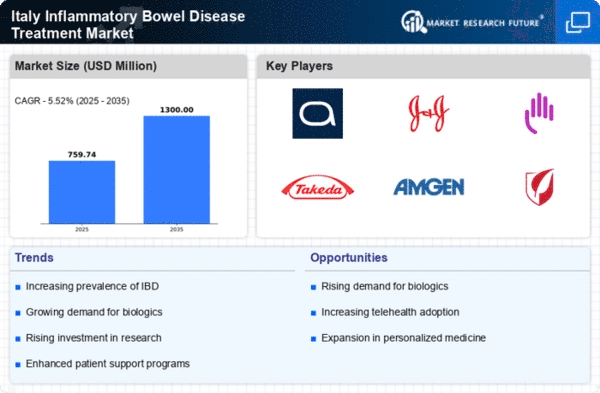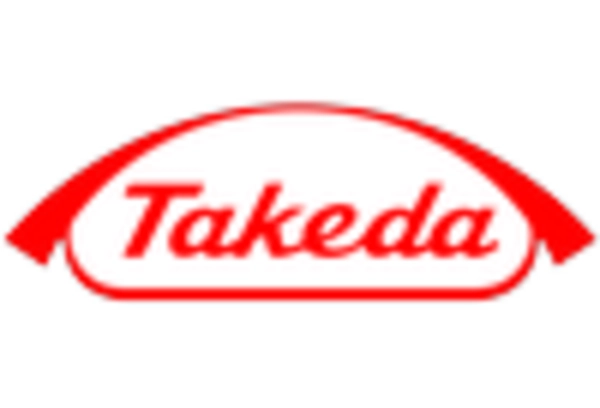Growing Awareness and Education
The growing awareness and education surrounding inflammatory bowel disease are essential drivers for the inflammatory bowel-disease-treatment market. Increased public and professional knowledge about IBD symptoms, diagnosis, and treatment options has led to earlier detection and intervention. Campaigns aimed at educating both healthcare professionals and the general public have been instrumental in reducing stigma and encouraging individuals to seek medical help. This heightened awareness is likely to result in a larger patient population seeking treatment, thereby expanding the market. Furthermore, educational initiatives can foster better patient adherence to treatment regimens, which may improve overall health outcomes and reduce healthcare costs associated with IBD management. As awareness continues to grow, the inflammatory bowel-disease-treatment market is expected to experience sustained demand.
Government Initiatives and Funding
Government initiatives aimed at enhancing healthcare access and funding for IBD treatments are pivotal for the inflammatory bowel-disease-treatment market. In Italy, the government has recognized the need for improved management of chronic diseases, including IBD, and has implemented policies to support research and development in this area. Increased funding for healthcare programs and initiatives focused on IBD can lead to better treatment options and increased patient access to therapies. For example, the Italian Medicines Agency (AIFA) has been actively involved in evaluating and approving new treatments, ensuring that patients have access to the latest therapies. This supportive regulatory environment is likely to encourage pharmaceutical companies to invest in the inflammatory bowel-disease-treatment market, ultimately benefiting patients and healthcare providers alike.
Advancements in Treatment Modalities
Innovations in treatment modalities are significantly influencing the inflammatory bowel-disease-treatment market. The introduction of novel therapies, including biologics and small molecules, has transformed the management of IBD in Italy. For instance, the approval of new biologics has expanded the therapeutic options available to patients, leading to improved clinical outcomes. The market for biologics is projected to grow at a CAGR of around 10% over the next few years, reflecting the increasing reliance on these advanced treatments. Additionally, the development of combination therapies is gaining traction, as they may offer enhanced efficacy compared to monotherapy. These advancements not only improve patient outcomes but also drive competition among pharmaceutical companies, fostering further innovation in the inflammatory bowel-disease-treatment market.
Rising Demand for Patient-Centric Solutions
The shift towards patient-centric solutions is increasingly shaping the inflammatory bowel-disease-treatment market. Patients are becoming more involved in their treatment decisions, seeking therapies that align with their preferences and lifestyles. This trend is prompting pharmaceutical companies to develop more personalized treatment options, including those that consider genetic, environmental, and lifestyle factors. The demand for patient-centric solutions is reflected in the growing interest in digital health tools, such as mobile applications and telemedicine, which facilitate better patient engagement and monitoring. As patients seek more control over their health, the market is likely to see an increase in innovative solutions that cater to these needs. This evolution towards patient-centered care may enhance treatment adherence and satisfaction, ultimately driving growth in the inflammatory bowel-disease-treatment market.
Increasing Prevalence of Inflammatory Bowel Disease
The rising incidence of inflammatory bowel disease (IBD) in Italy is a crucial driver for the inflammatory bowel-disease-treatment market. Recent studies indicate that approximately 0.5-1% of the Italian population is affected by IBD, with a notable increase in cases over the past decade. This growing patient population necessitates the development and availability of effective treatment options. As awareness of IBD increases, more individuals seek medical attention, leading to higher demand for therapies. The Italian healthcare system is adapting to this trend by allocating more resources to IBD management, which is likely to enhance the market landscape. Furthermore, the increasing burden of IBD on healthcare resources may prompt government initiatives aimed at improving treatment accessibility and affordability, thereby stimulating market growth.
















